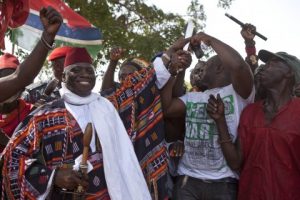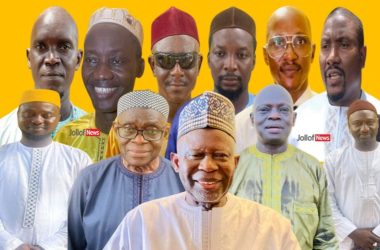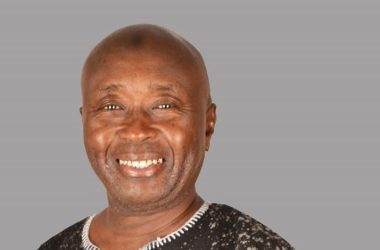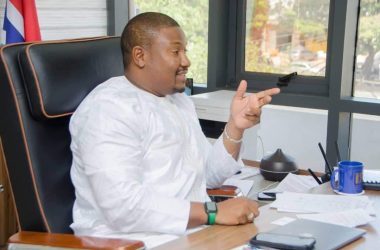
(JollofNews) – The King of Bechuanaland was very oppressive and suppressive, in short brutal. He killed his subjects, took their properties and did whatever else he wished to them.
They got fed up with him and plotted to get rid of him. Enough was enough! A group of citizens got together secretly to decide how to go about it. They flung around all types of violent ideas. Some wanted to assassinate him, some wanted to poison him, some wanted to launch guerrilla warfare against his disorganized and weak army, others wanted to kidnap him. A lame man sitting at a corner of the room during the meeting raised his hand and said calmly, “I have a better idea!”
“What can you do?” someone tried to make fun of him. “Lead us in a battle against him?”
“Let him speak,” another intervened.
“Find out what are the three things he likes the most and come back to me,” he requested.
The men did their research through the close associates of the King who did not like him, although they always pretended to, because of fear, vested interest, or both. These associates carried out the King’s dirty orders. They clapped for him whenever he spoke in public, even when, as almost always, he spoke rubbish. He had no respect for them.
Nevertheless, they sang his praises until the day he got rid of them – one way or the other. Then the lucky ones, who managed to flee, sought sanctuary in other kingdoms. From their safe abodes they hurled insults at their former boss, forgetting that they once sang songs for him to dance to.
The people of Bechuanaland called these former supporters of the King “the weather men”, because of their abilities to change their colors. The King himself made fun of them: “Look at you, opportunists! There is no shortage of people like you in this kingdom. I can change you like my dirty socks!” Despite these insults, they never resigned. Scholars, lawyers, army generals and men old enough to be the King’s father were among “the weather men”. They all called him “Our Father Who art on Earth!”.
The conspirators met again and a report was given to the lame man: the King loved meat, gold and to be flattered. “OK,” he said, ”we will send a delegation to him from all parts of the kingdom.”
The delegation went to His Oppressive Royal Highness. They took a lot of gold and a herd of fat cows for him. They showered him with praises and told him he was the best of his lineage in a thousand years who ruled their land. Although he was a coward who never saw the sight of a battle, they called him the Conqueror of the Conquerors!
Although he could hardly read and write, they called him the Scholar of the Scholars. They offered to give him every year 1000 fat cows and a weight of gold equivalent to his own weight.
The King had never felt so good. However, he had one problem and a rather big one too; he was a small man with little weight. In order to get more of his favorite toy (gold) he had to do a lot more eating than he has ever done in his life. So he ate and ate and ate!
Within a year he gained so much weight that he could hardly be recognized. In fact, as the months passed by, the elders started to get worried about their ability to find enough gold to match his weight! When they finally got to the end of the first year there was relief and a big celebration in the kingdom as the cows were herded into the city and the servants carried the gold to the throne. Before the end of the third year, the King had become so fat that he suffered a heart attack and died.
***
The Morals
The morals of this story, which I wrote for the first time on October 21st, 2016, are obvious and several. Power and greed can blind, wisdom is stronger than force and oppressors or bullies are often weaker than they appear.
Memories of Addis Ababa
When I tried to publish the story on my website in October, my editors (family and friends) advised me not to, because someone in The Gambia might think I was referring to him.
I relented, but their concern gave me an idea to write to His Excellency, my President, Sheikh and Babili Mansa Dr Jammeh, confidentially, to remind him of a conversation I had with him at the Ghion Hotel in Addis Ababa, only a year after the coup on July 22nd, 1994.
About two months before the coup, I had been privileged to meet, in a palace close to the Ghion, the fine gentleman whom Jammeh had overthrown (Sir Dawda Jawara).
The palace had been inhabited by Emperor Haile Selassie, the Lion of Judah. He was overthrown by Lt. Colonel Mengistu in 1974, died and was buried under the floor of a lavatory in 1995. His lions and golden forks and knives were still lying in the palace at the time of my visit.
Few people in this world have the opportunity to closely perceive the history of so many fallen (and yet to fall) African leaders in such a small area, within such a short period of time, as I did in Addis in July 1995.
I was taken to Selassie’s palace by another fine gentleman, also a Minister and an uncle (B.B. Dabo), a man I have always appreciated and respected. One of the Emperor’s most famous quotes is: “It is much easier to show compassion to animals. They are never wicked”. How sadly still true, in spite of a modern world with educated, knowledgeable and sophisticated humans in an internet-age!
A 10-year old child today, in The Gambia and the rest of the world, can own a laptop and have access to information about almost everything, the totality of which the whole world did not possess only three times his age ago.
The purpose of knowledge is to make life better for ourselves and others in this world and (for those of us who believe in God) the hereafter. If, in spite of all the knowledge that we have today, in The Gambia and the rest of the world, the animals are still ahead of us in compassion, then maybe we should think of calling the animals humans and ourselves animals, because compassion makes us truly human and humane.
In any situation in which our actions can hurt others, especially when we have the upper hand or believe we have the right to hurt, compassion can be the strongest basis for voluntary compromise if we are truly human and humane.
Jammeh was surrounded in Addis Ababa by young men and women from my high school or village and other contemporaries who had known me because of my student activities at high school. There were also older compatriots from the United Nations Economic Commission for Africa (UNECA) and the Organization of African Unity (OAU, now AU), both of which I have worked for.
In an attempt to encourage me to join the new head of state’s government, I was given unequalled attention by the visitors. Jammeh was warmly welcomed by my colleagues from the UNECA and OAU (one of whom later became his Minister), who also thought I was a natural candidate for a Ministerial position.
One night, late, as I ate grilled mutton and watched television with him, I decided to seize the opportunity to advise him to be careful about two dangers: power and wrong advice. He listened with such attention and modesty that I felt that he was a good man, who could be trusted to do good for The Gambia and who would leave after the two-year transition that he had promised.
But there came the bad news whilst I was with him that same night. It was as if a warning to me. As I walked out, one of the aides whispered to me that the Minister of Finance, Koro Ceesay, was killed under mysterious circumstances (on June 23rd). Another told me that Capt. Sadibou Haidara, member of the Armed Forces Provisional Ruling Party (AFPRC, of which Jammeh was Chairman), had also died, in prison on the 3rd of that fateful month. He and Lt. Sana Sabally had been arrested and accused of an attempted counter coup. Too many deaths for my liking!
By the time the delegation left, I had decided not to accept any offer from the new Government, a decision I stood by in spite of subsequent efforts to persuade me, directly or indirectly. However, I decided to continue sending investors and humanitarian organizations to the country, which I had started to do since 1992, during the Jawara Administration.
Power and bad advice corrupt
I met Jammeh again twice during my visits home, the last time in 1999, but he was no more the Chairman I saw in Addis: elders had “begged” him to run for the office of President (as they did with Jawara in 1992 and may do with Barrow in 2019), his weight had changed and, drastically, his tone.
He was the confident lecturer who had learnt in office and whom the rustle of leaves on the windows of Ghion hotel would no longer bother. He was President and determined to stay. The dangers of power and bad advice, which I had warned against, seemed to have crept in.
Reports of disappearances, killings, imprisonment, beatings, etc, were increasing. His accolades were also increasing. I sometimes found it difficult to believe that the young man (now referred to as Kebba (the Old Man)), who quietly and humbly listened to me in 1995, from a country where citizens put hadamaya (humanity – in my native Mandinka) before everything else, is the one under whose watch all such terrible things were said to be happening.
In addition to my concern for the safety of my compatriots at home, I began to feel uneasy in the last few years, for the first time in my life, about visiting my own country. I have also never felt a stronger urge to speak. Yet, family and friends advised me: “He is very dangerous. If he can’t get you, he may go for your relatives in The Gambia!” Acquiescent, but unhappy that if everyone keeps quiet in the face of wrong goodness will never triumph. In a sad twist, relatives and friends started to be picked by the security forces. They included a cousin of mine and the brother-in-law of one of my nephews.

As I was running around to arrange the release on bail of my dear cousin, a brother was picked up. Earlier, in order to avoid arrest, another friend had fled to Senegal, where he died. Although these arrests had nothing to do with their relationship with me, I was quick to learn something – when there is landatambo (excess) in oppression, anyone may become a victim, even the silent.
When there is such landatambo, even the agents of oppression themselves can become victims, because of one reason or another (fear, misinformation, greed, poverty and/or other factors). They may be forced to oppress even their friends, neighbours and relatives, including their spouses, whether they like it or not.
I learnt these facts several years ago when at home for another visit and decided to advise someone publicly accused of being the top assassin for Jammeh. He was a security officer who had harmlessly worked under Jawara for many years. I had known him since childhood, so he came willingly when I contacted him through a mutual friend of ours. His Boss had earlier put him under house arrest for several months before releasing and redeploying him.
He drove to me in a black mercedez benz, without a number plate. It was at the time of the maghrib prayer when he arrived. He agreed to pray with me and after the prayer I talked to him about the rumours I have heard.
I warned him that “life is too short and one day we will all be accountable for the bad things we have done in this world”. He did not deny or accept the rumours, but he told me what he had personally gone through with his Boss. Like Jammeh in Addis, I was astonished at how well he took my advice and how ordinary he seemed in private. “If you don’t advise me, I don’t know who would,” he thanked, informed me that he was sick and left. He died some months later. That was in 2007.
I tried to try my hand with Jammeh last month (November). “It is time to write,” I said to my nephew in England and other confidantes. If there is still a potential flare of goodness in him that I thought he had in 1995, as he joked with his entourage and as I sat with him, it might not be too late to spark it. I might be able to get his attention, change his style and start a process of reconciliation and healing in The Gambia.
After all, I am an apolitical and not a political citizen with no hatred for him and just want to advise him in camera and not on camera. There is never any harm in igniting a rusty engine. Like Hercules, I might be able to lift the ugly mountain of unfettered power from someone who had everything that he perhaps never dreamt of.
As Lord Acton puts it, “Power tends to corrupt, and absolute power corrupts absolutely.” How many of us would not behave like Jammeh if we were in his shoes? As history has shown again and again, perhaps his problem is not particular. Perhaps the problem is the weak and ungrateful human being in him which lurks in all of us and which overcomes so many of us each time God’s Favour comes to us unexpectedly.
To be continued





God in heavens….